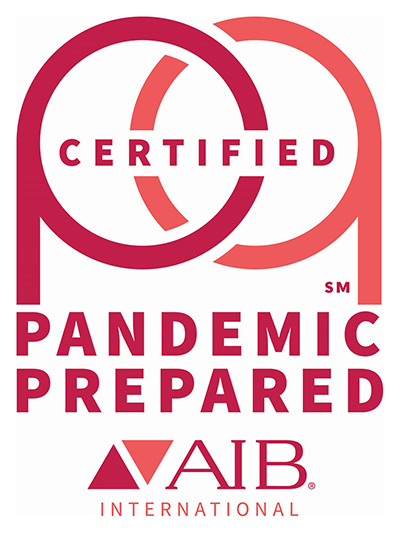COVID-19 Outlook & Impacts on the Food & Beverage Industry
-Oct-26-2021-07-43-07-31-PM.png)
The coronavirus pandemic came as a huge surprise for many, but it really shouldn’t have. Public health experts have been sounding the alarm for years. Now that we have been living and working for more than a year in the pandemic, what have we learned and how do we best move forward?
To better understand the impacts of the resulting COVID-19 disease on the food industry and the outlook on what’s next, we surveyed 325 food and beverage executives across North America and interviewed an additional 16 about what COVID-19 has cost their companies and how they are preparing for the next pandemic.
What we found is startling – 30 percent of food industry executives think we’ll see another pandemic in the next four years, while half say they still feel unprepared for the next pandemic. This demonstrates not only the importance of current COVID-19 protocols, but also the need to critically examine their pandemic preparedness plans for the future.
In this report, we’ll examine the food & beverage industry’s readiness for COVID-19, how COVID-19 impacted their companies and how they reacted. Finally, we’ll look at how food & beverages executives feel about the future.
Methodology
For this report, we partnered with Research Strategy Group to survey 325 Food & Beverage executives in the United States, Canada and Mexico. Survey responses were collected between March 19-24, 2021, using an email invitation, online survey and in-depth interviews (16).
The Food & Beverage Industry Wasn’t Prepared for COVID-19
The majority of companies (61 percent) say they were not adequately prepared for the current pandemic. While most had plans in place prior to COVID-19 (63 percent), a third of them said these plans did not adequately address COVID-19 and its effects. Thirty-eight percent said they didn’t have pandemic preparedness plans at all prior to the pandemic.
-Oct-26-2021-07-43-08-34-PM.png)
Pandemic Preparedness by Company Size
Our research found that companies with revenue of less than $250MM felt less prepared for the COVID-19 pandemic.
-Oct-26-2021-07-43-11-06-PM.png)
Additionally, processors and manufacturers with less than $500MM revenue were less likely to have a plan in place that adequately addressed the COVID-19 pandemic.
Pandemic Preparedness by Sector
Processing and manufacturing companies were more prepared to deal with the pandemic when compared to other sectors, such as retail, packaging, storage and distribution, and import/export.
-Oct-26-2021-07-43-13-76-PM.png)
Prepared Companies Performed Better Financially During COVID-19
The research found that 62 percent of companies experienced an increase in operating costs, with an average operating cost increase of 11 percent. One in three companies experienced a decrease in revenue, averaging 27 percent.
-Oct-26-2021-07-43-09-36-PM.png)
Food and beverage companies that say they were better prepared were 2 times more likely to report no significant change in operating costs and were 2.5 times less likely to have experienced a decrease in revenue.
-Oct-26-2021-07-43-07-85-PM.png)
-Oct-26-2021-07-43-14-25-PM.png)
Financial Impacts by Company Size
Large companies ($500MM - $1BN) were most impacted by increased operating costs, reporting 20 percent average increases. 75 percent of the largest companies, those with more than $1BN in annual revenue, were also more likely to report increases in operating costs.
-Oct-26-2021-07-43-10-64-PM.png)
When it came to the top line, it was those with less than $250MM in revenue that were more impacted, reporting larger decreases in revenue than larger companies.
Overall, three in four food and beverage companies were either impacted by increases in operating costs or decreases in revenue. Of this group, a quarter reported the worst-case scenario – both an increase in operating costs and a decrease in revenue.
Companies Faced Workforce, Sales and Logistic Issues Due to COVID-19
-Oct-26-2021-07-43-09-78-PM.png)
The top three issues faced by companies due to the COVID-19 pandemic were: Employee absenteeism; Cancelled or reduced orders; and Distribution interruptions.
These results were not surprising, as many companies established protocols that directed employees to stay home when they have a fever or have been in contact with someone who had tested positive for COVID-19.
We also heard from companies that saw orders reduced or cancelled when they were unable to deliver their usual quantities due to a reduction in their workforce or interruptions to their normal distribution.
Companies are Updating Their Food Safety and Health Crisis Plans in Response to COVID-19
The majority of executives said they were addressing the pandemic by updating their food safety plan, improving their health crisis mitigation measures, and updating their crisis management plan to include pandemics.
-Oct-26-2021-07-43-12-16-PM.png)
At AIB International, we’ve been providing companies with free reviews of their pandemic preparedness plans, while also helping companies get started on developing plans if they don’t have one. Through this work, we found that 75 percent of pandemic preparedness plans were still missing critical requirements in their food safety and health crisis mitigation plans. By missing some of these most important steps, companies were left at elevated risk.
Executives Anticipate the Next Pandemic Very Soon
-Oct-26-2021-07-43-13-45-PM.png)
Make sure you’re updating your plans to meet best-in-class standards for pandemic preparedness. There are free tools to help you get started on updating your plan.
Thirty percent of all Food & Beverage executives think we’ll see another pandemic in the next four years (that’s 2025!) and half think we’ll see the next one within 10 years. In addition, 78 percent of companies are taking steps to prepare now for the next pandemic. For companies that had preparedness plans in place before COVID-19 struck, almost all said they had revised their plans due to this pandemic.
Almost Half of Executives Don’t Feel Very Prepared for Future Pandemics
-Oct-26-2021-07-43-08-76-PM.png)
While more companies now say they more prepared, close to half still don’t feel very confident with smaller companies (less than $500MM revenue) saying they feel even less prepared.
Companies Should be Pandemic Prepared
The food and beverage industry wasn’t well prepared when first faced with COVID-19, but almost all companies are now taking action now to prepare for the next pandemic.
While larger companies reported higher operational costs and smaller companies reported a larger revenue decrease, these financial impacts and operational disruptions like workforce shortages and supply chain interruptions can be mitigated by strong preparedness planning.
The COVID-19 pandemic has shown us that employees demand greater accountability from their employers, while customers expect order fulfilment throughout crises.
Beyond the spectre of employee health, consumers expect their trusted brands to maintain high food safety and quality standards, and for their favorite products to be available on store shelves a crisis – when they need it most.
Trustworthy, independently verified proof that companies are well-prepared for the disruptions associated with a pandemic can help meet these many expectations.
Whether you already have a written pandemic preparedness plan or haven’t developed one yet, companies need to take action now to ensure their operations hold up against the next pandemic.
Keep Your Offices and Facilities Safe with Pandemic Prepared Certification

With Pandemic Prepared Certification, you can be confident that you’ve developed and implemented strict protocols around pandemic crisis management, health crisis mitigation, food safety and more. Get a comprehensive assessment of your pandemic preparedness plans and protocols, close your gaps, and get recognized for establishing and maintaining best-in-class standards.
Prove your commitment to COVID-19 best practices today. Visit aibinternational.com to get started or contact us to learn more.
Get Started for Free
Get our checklists, start closing gaps in your preparedness plan.
Contact our experts today at ppc@aibinternational.com


